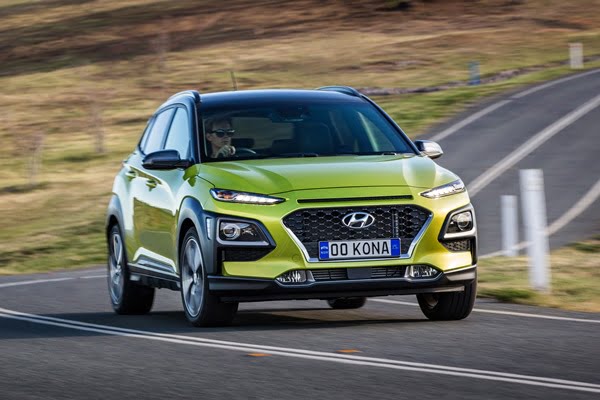 The interior of the Hyundai Kona is …well a little different. It certainly is aimed at the inner city trendy buyer, especially the top of the range Highlander.
The interior of the Hyundai Kona is …well a little different. It certainly is aimed at the inner city trendy buyer, especially the top of the range Highlander.
Please do not mistake trendy or “on trend” to forsake functionality.
The overall feeling when first sitting inside is of space, which is perpetuated by the high roof and a strong horizontal character line giving a wide, spacious feeling. Also a little surprisingly, given its design, there appears to be reasonable all round visibility.
The front seats are fairly comfortable, the Highlander with its leather covering and electrically adjustable lumbar support, is the most comfortable.
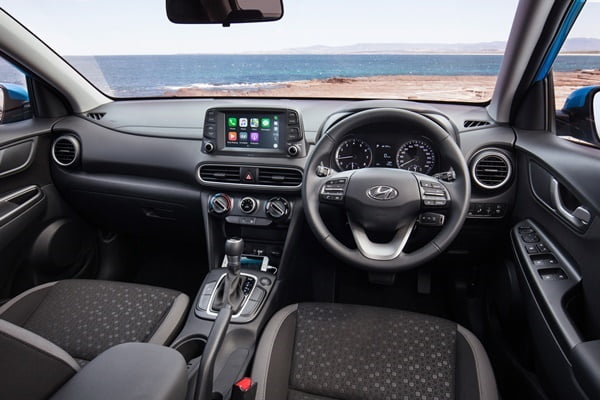
The entry level Active fabric seat lacks enough lumbar support for those with a dodgy back, but I guess millennials don’t have such problems.
There is enough front space for taller drivers, without feeling cramped, but I did wish for a little more reach adjustment for the steering wheel. In front of the driver is a typical twin dial dash with a MFD between the dials. This is a tried and true design and in the case of the KONA works pretty good.
The steering wheel again has what has become standard, with controls for the cruise control and infotainment system on the central spokes. Happily the indicator and wiper stalks sit a little above the wheel spokes to aid in visibility.
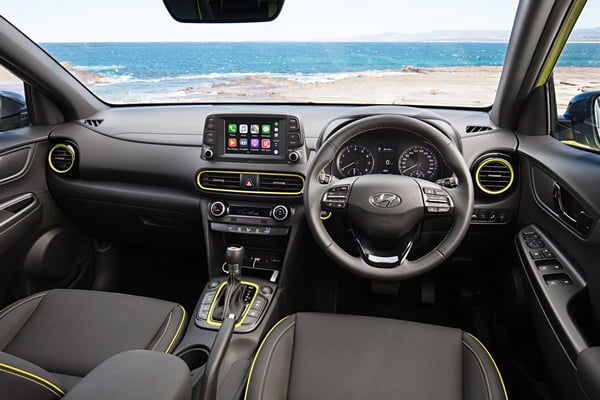
The central stack is dominated by a 7 inch touchscreen, tablet style infotainment system, which houses the Android Auto and Apple Car Play system. There is no in-house navigation system, relying on the smart phone systems. I guess that the target market won’t really venture too far from reception, so this shouldn’t present a problem. The tablet style system sits above the sloping dash, yet doesn’t intrude on visibility. Clever design.
Below the screen sits the air conditioning vents and again below that the controls. To the side there are two large round vents that not only feel integrated, look cool but provide plenty of air movement.
Two other clever features include wireless phone charging and in top spec Highlander, a head up display.
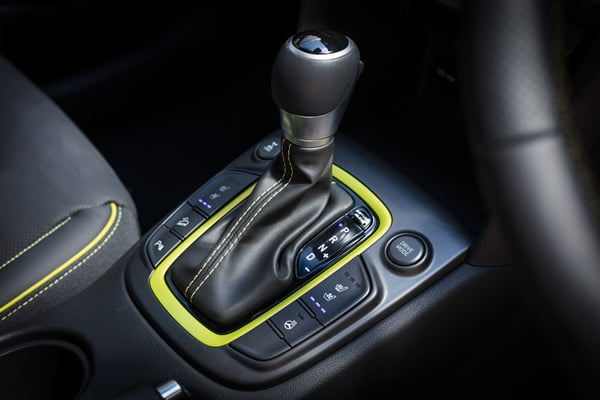
The central console houses the transmission, cup holders, and on the higher spec models a range of buttons for various features.
It seems that younger buyers are all about customisation for their vehicles. It is an extension of their differing personalities. To cater for this Kona Elite and Highlander can be specified with vibrant and fun acid yellow or red leather interior treatments which bring colour-matched piping and stitching to the seats, steering wheel, front armrest and gearshift boot.
Metallic colour matching is also used for the trim surrounding the air vents, starter button and transmission housing and, to make the interior even more eye-catching, acid yellow or red seatbelts increase the individuality factor, contrasting with the black headlining to further enhance interior ambience.
Pushing the customising envelope even further, the acid yellow and red leather interior treatments can be enhanced with piano black finish on the door handles, air vents, transmission housing trim surrounds and steering wheel.
While the interior provides a spacious feel and certainly has some clever design features, it does feel like there is plastic everywhere. Some soft touch rubberised surfaces would soften the interior a lot. I know from the designer that is a function of the cost brigade.
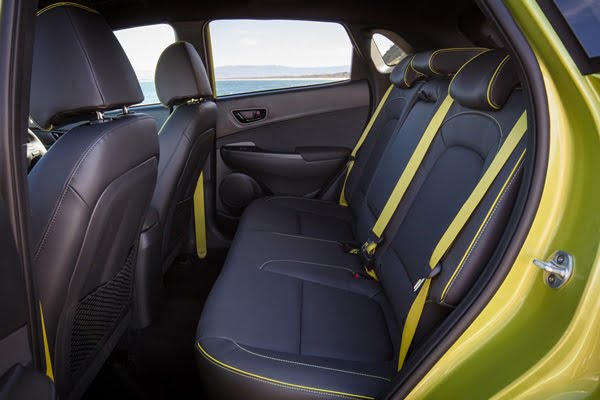
On the launch I sat in the back seat for a while and both the front passenger and I had enough room. This is impressive, given my rather large 190cm frame. The seats were good, again with enough headroom, leg, and knee and foot room as well. I wouldn’t want to be three passengers up back there though.
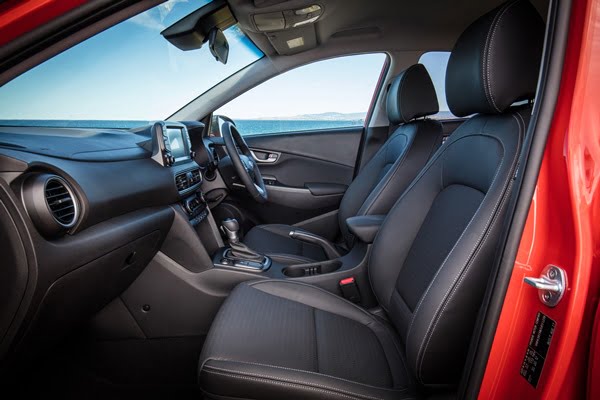
There is adequate storage with cup holders, in door bottle holders, centre console, and reasonable glove box. The boot appears small, but has a high load lip and the rear seats will fold down in a 60/40 format, to give more flexibility. The rear door opens fairly high but taller people will hit their head.
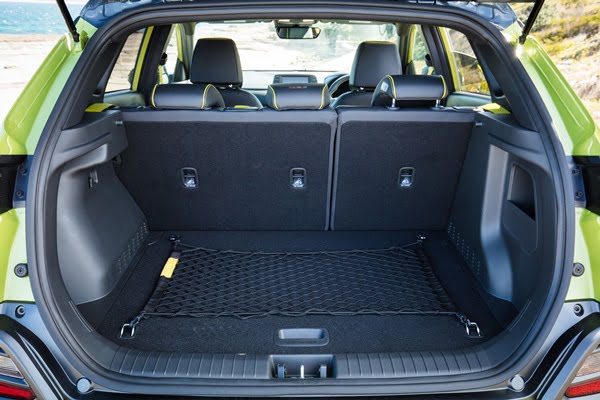
Carrying through some clever design features, Kona’s rigid boot floor can be used at two different heights, the lower setting maximising cargo volume and the upper setting raising the boot floor to make a completely flat loading area when the rear seats are folded, helping with carriage of long or bulky items. The rear suspension was engineered to allow a lower floor height and an improved rear seating position.
Hyundai Kona Overview and Exterior

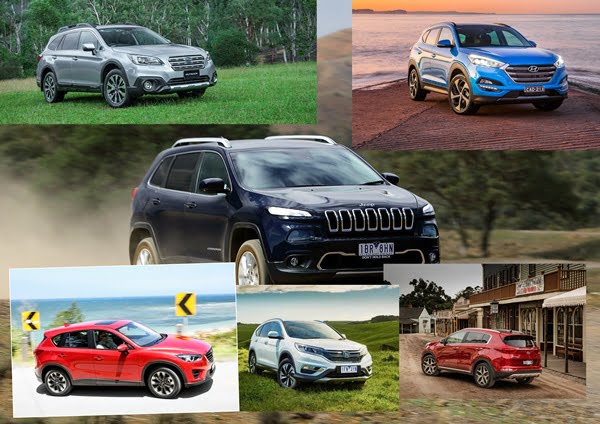
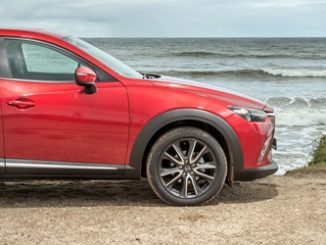
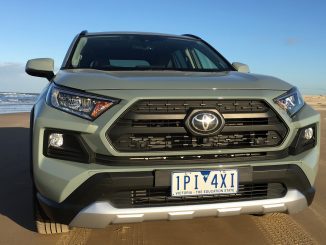
2 Trackbacks / Pingbacks
Comments are closed.